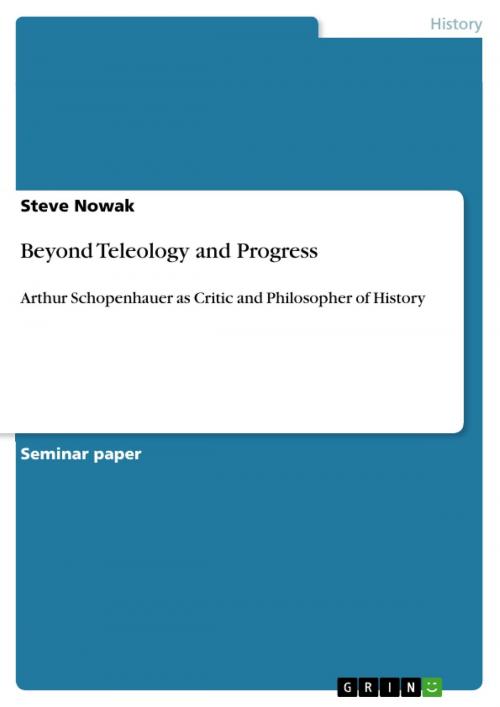Beyond Teleology and Progress
Arthur Schopenhauer as Critic and Philosopher of History
Nonfiction, History| Author: | Steve Nowak | ISBN: | 9783640585458 |
| Publisher: | GRIN Publishing | Publication: | April 6, 2010 |
| Imprint: | GRIN Publishing | Language: | English |
| Author: | Steve Nowak |
| ISBN: | 9783640585458 |
| Publisher: | GRIN Publishing |
| Publication: | April 6, 2010 |
| Imprint: | GRIN Publishing |
| Language: | English |
Seminar paper from the year 2010 in the subject History - Basics, grade: 1,0, East Tennessee State University (History Department), course: Historiography, language: English, abstract: The traditional view of history as progress was strongly criticized by important characters such as Jacob Burckhardt, Friedrich W. Nietzsche, or Oswald Spengler. Godfather of these ideas was none less than Hegel's most persistent adversary Arthur Schopenhauer. First and foremost, he and Nietzsche fought a 'guerilla war' against the traditional purposeful philosophies of history. It is no accident that their ideas are not considered in most compositions dealing with the development of the philosophy of history. They simply seem not to fit in a linear sequence with any of the given. This paper is meant to underline that this largely German tradition has its most important critic in a German philosopher. I will try to summarize Schopenhauer's thought on history and the philosophy of history. Therefore I will search his most important works as well as secondary literature concerning some key questions. Did Schopenhauer explain what history is, how it works, and what purpose it has? Where did he agree and where contradict with his predecessors and contemporaries?
Seminar paper from the year 2010 in the subject History - Basics, grade: 1,0, East Tennessee State University (History Department), course: Historiography, language: English, abstract: The traditional view of history as progress was strongly criticized by important characters such as Jacob Burckhardt, Friedrich W. Nietzsche, or Oswald Spengler. Godfather of these ideas was none less than Hegel's most persistent adversary Arthur Schopenhauer. First and foremost, he and Nietzsche fought a 'guerilla war' against the traditional purposeful philosophies of history. It is no accident that their ideas are not considered in most compositions dealing with the development of the philosophy of history. They simply seem not to fit in a linear sequence with any of the given. This paper is meant to underline that this largely German tradition has its most important critic in a German philosopher. I will try to summarize Schopenhauer's thought on history and the philosophy of history. Therefore I will search his most important works as well as secondary literature concerning some key questions. Did Schopenhauer explain what history is, how it works, and what purpose it has? Where did he agree and where contradict with his predecessors and contemporaries?















